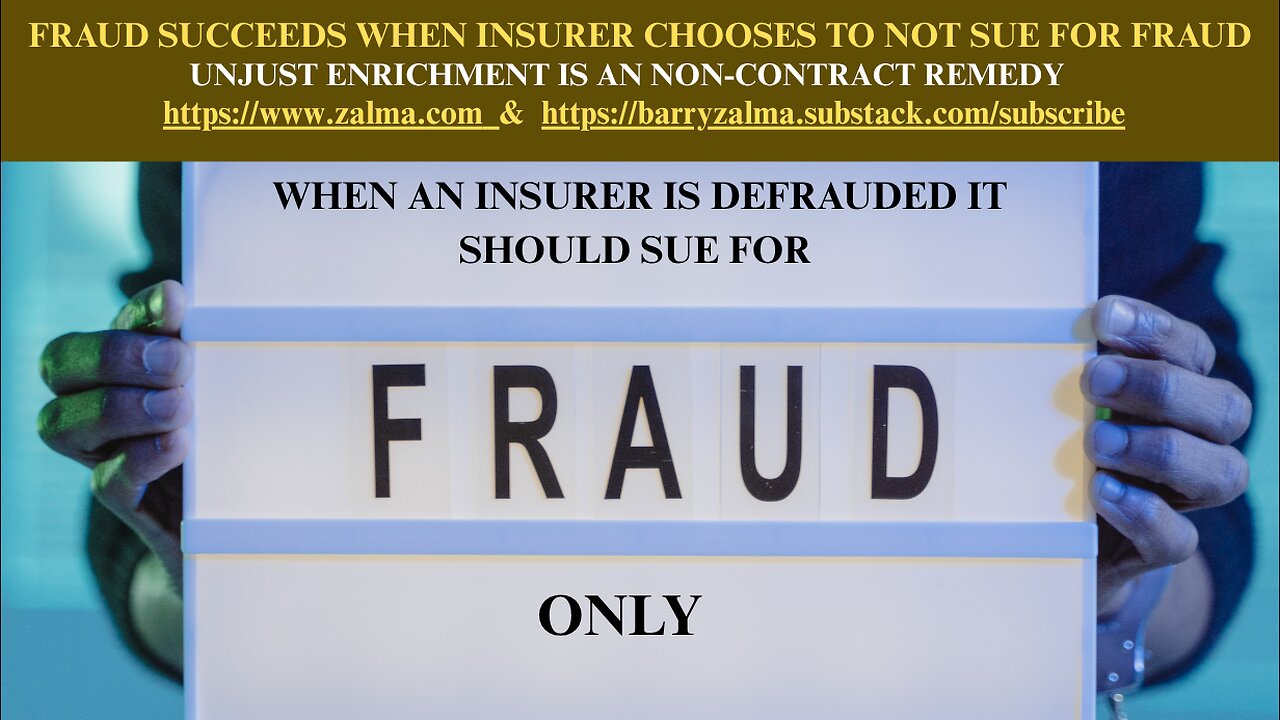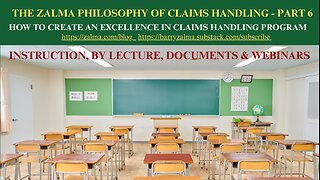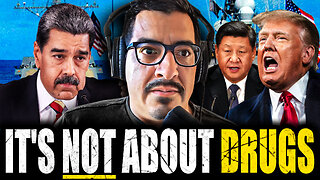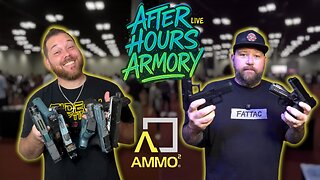Premium Only Content

Fraud Succeeds When Insurer Chooses to Not Sue for Fraud
Unjust Enrichment is an Non-Contract Remedy
Post 5158
When an Insurer is Defrauded it Should Sue For Fraud Only
MONY Life Insurance Company v. Bernard R. Perez, No. 23-10770, United States Court of Appeals, Eleventh Circuit (July 23, 2025) resulted in a decision that allows an insured of a Disability Insurance policy to successfully defraud his insurer.
The case involved a dispute between MONY Life Insurance Company and Bernard R. Perez, an ophthalmologist, over a disability insurance contract. Perez was diagnosed with throat cancer in 2011 and began receiving monthly disability benefits from MONY. However, MONY later suspected Perez of dishonesty in his disability claims and discontinued payments in 2018.
FACTS
In 1987, ophthalmologist Bernard R. Perez formed a for-profit medical practice in Tampa, Florida. Soon thereafter, in June 1988, Perez applied for, and, in September 1988, was issued a disability insurance policy by MONY Life Insurance Company.
Perez underwent successful surgery in June 2011 and was subsequently treated with proton beam radiation therapy in July and August 2011. Since his treatment, Perez has been cancer-free. Perez submitted a disability claim form to MONY in July 2011 asserting that he was unable to work, and in August 2011 he began receiving monthly disability benefits.
KEY ISSUES
Unjust Enrichment Claim
MONY sued Perez for unjust enrichment, claiming he received benefits he was not entitled to due to misrepresentations about his medical condition and financial information. The jury initially awarded MONY $388,000, but the USCA set aside this verdict, stating that an unjust enrichment claim cannot lie when there is an express contract covering the same subject matter.
Breach of Contract Counterclaim:
Perez counterclaimed for breach of contract, arguing that MONY wrongfully stopped his benefits. The jury found in favor of MONY, and the USCA affirmed this verdict, noting that Perez had submitted false and misleading information in his proofs of loss.
ELEVENTH CIRCUIT'S CONCLUSION
MONY determined that Perez may have been dishonest in submitting basic information related to his disability and his financial condition, and, in February 2018, it discontinued making further payments to Perez.
MONY sued Perez for unjust enrichment and Perez counterclaimed for breach of contract. After a nine-day trial, during which extensive evidence established Perez's deceitful conduct, a jury returned a verdict in favor of MONY on its unjust enrichment claim, awarding it $388,000.
At trial, MONY convincingly demonstrated that many of the business expenses submitted by Perez were untruthful. Moreover, MONY established that Perez was deceptive in reporting how many hours he worked.
After a nine-day trial, the jury ultimately determined that Perez had been unjustly enriched and that MONY did not breach the insurance contract. Accordingly, the jury awarded MONY $388,000 in damages accrued between August 2015 and January 2018.
DISCUSSION
Florida courts have held that a plaintiff cannot pursue a quasi-contract claim for unjust enrichment if an express contract exists concerning the same subject matter holding that a plaintiff cannot pursue an equitable theory, such as unjust enrichment or quantum meruit, to prove entitlement to relief if an express contract exists that covers the same topic.
MONY's unjust enrichment claim failed under Florida law because it covers the same subject matter as the insurance contract.
While MONY attempted to amend its complaint (for the fourth time) to assert a claim for fraud, very late in the day of this protracted litigation, the district court exercised its considerable discretion in denying the motion in the interests of timing and efficiency.
The USCA concluded that the district court erred under Florida law in allowing MONY's unjust enrichment claim to move forward. The claim should not have been sent to the jury. Accordingly, the USCA set aside the jury verdict in favor of MONY on its unjust enrichment claim and, on remand, directed the district court to vacate its judgment awarding MONY $448,930.06.
The evidence adduced at trial overwhelmingly established that Perez repeatedly submitted false and misleading information material to his proofs of loss.
ZALMA OPINION
MONY was too smart by half for its own good in this case where it had overwhelming evidence the Dr. Perez misrepresented material facts when he presented claims and proofs of loss which proof of fraud was affirmed on appeal. However, with a cause of action for the blatant fraud available to MONY it did not sue for fraud. Because MONY did not sue for fraud and its attempt to amend the complaint until its 4th attempt to amend was too late. Common law fraud would have allowed MONY to seek every dollar paid to Perez plus extracontractual damages but tried to be "nice" by only seeking non contractual relief.
(c) 2025 Barry Zalma & ClaimSchool, Inc.
Please tell your friends and colleagues about this blog and the videos and let them subscribe to the blog and the videos.
Subscribe to my substack at https://barryzalma.substack.com/subscribe
Go to X @bzalma; Go to Barry Zalma videos at Rumble.com at https://rumble.com/account/content?type=all; Go to Barry Zalma on YouTube- https://www.youtube.com/channel/UCysiZklEtxZsSF9DfC0Expg; Go to the Insurance Claims Library – https://lnkd.in/gwEYk.
-
 8:40
8:40
Insurance Law
9 days agoThe Zalma Philosophy of Claims Handling - Part 6
271 -
 2:12:18
2:12:18
Side Scrollers Podcast
18 hours agoSide Scrollers VTuber TAKE OVER with Kirsche, Rev Says Desu & DarlingStrawb | Side Scrollers
84.6K11 -
 29:15
29:15
BlabberingCollector
1 day agoHarry Potter X Fortnite, Fans Reee Over Trans Rights, NEW Audiobooks Are OUT, Wizarding Quick Hits
4.33K -
 1:20:42
1:20:42
The Connect: With Johnny Mitchell
5 days ago $0.27 earnedThe Truth Behind The U.S. Invasion Of Venezuela: Ed Calderon Exposes American Regime Change Secrets
7.34K3 -
 LIVE
LIVE
Lofi Girl
3 years agolofi hip hop radio 📚 - beats to relax/study to
292 watching -
 21:39
21:39
TruthStream with Joe and Scott
2 days agoJoe, Scott and Lewis, Censorship and the Nov 8th event in Carlsbad California!
7.53K2 -
 22:47
22:47
The Pascal Show
1 day ago $0.21 earnedTHEY’RE HIDING EVIDENCE?! Candace Owens EXPOSES Foreign Connection In Charlie Kirk Shooting
34.3K37 -
 7:44:50
7:44:50
SpartakusLIVE
10 hours agoThe Duke of Nuke CONQUERS Arc Raiders
168K4 -
 1:05:26
1:05:26
Man in America
12 hours ago“Poseidon” Doomsday Sub, Microplastics & The War on Testosterone w/ Kim Bright
23.5K21 -
 2:23:54
2:23:54
DLDAfterDark
8 hours ago $0.16 earnedGun Talk LIVE! Thursday At The Armory! Feat. Josh of BDG&G & DLD
26.6K4